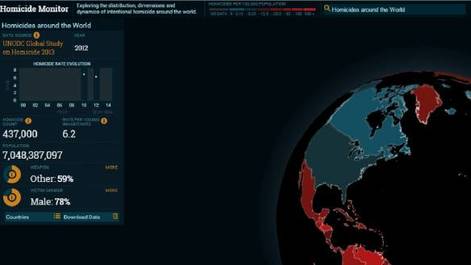 Nicholas Marsh
Nicholas Marsh By 2011, authors working with the Small Arms Survey wrote about how video clips uploaded to YouTube and other forms of social media “contain a wealth of information that is beginning to shape public understanding of the arms trade.” Personally, I had used YouTube and other sites to locate images of arms used in the Libyan civil war, including weapons supplied by foreign powers. However, when a few of the small band of arms trade researchers got together we realized that social media presented huge problems. Watching videos and searching through them for information was very time consuming; and geo-locating and verifying their contents even more so. We earnestly wondered whether a funder would provide a grant for someone to spend all their time looking at YouTube videos, searching Facebook and tracking other online sources.
Fortunately, the solution came as a new group of researchers – often blogging in their spare time – dedicated the time and developed the methods needed to analyze videos and other material found via social media. This was made possible by a key new element of the technology of research – the ability via social media to rapidly create networks, share information, and even raise money. Eliot Higgins and the others publishing at Bellingcat are among the most prominent today at this, and they are joined by other researchers who have made globally important findings from sources of information that didn’t exist just over a decade ago.
While our knowledge has certainly advanced, there are still very important areas that are unknown or at best opaque. Outlined below are areas where the need remains to develop new technologies of research, without forgetting the contributions of written sources, databases, social media, and fieldwork.
Beyond the low hanging fruit. Arms flows into and within the wars in Libya, Syria, Iraq and Ukraine have understandably received a lot of attention, but there are many other wars where information from social media, databases and written sources is much more difficult to obtain or analyze – in particular sub-Saharan Africa. Fieldwork has always been an answer, but safety and more importantly resource constraints mean that it can only be carried out in a fraction of the places where it is needed. We need to develop methods to obtain more information on arms flows into and within the more difficult places to research.
Outside warfare. Most attention is understandably focused upon warfare, but by far the greatest proportion of violent deaths are homicides. The methods and flows of arms to areas with high levels of criminal violence are much less understood than to war zones with comparable levels of violent death. Analysis of these requires new data and innovative methodologies to analyze it. Some important work has been done, but much more is needed.

The Homicide Monitor interface panel. Photo: Screengrab
Repressive regimes and their weapons. An area that has been studied for a long time, but certainly needs more attention, is transfers to repressive governments. As well as items that have been studied for decades – weapons, ammunition, police equipment, and torture materials – a focus is needed on new technologies such as equipment used for mass surveillance.
Deeper questions on what matters and works. Finally, and most importantly, research has mostly focused upon working out what is being transferred to whom and how those transactions take place. These are important goals, but the information created needs to be used to answer larger questions. After over two decades of international attention on the conventional arms trade, culminating in the Arms Trade Treaty, we still need to know much more about:
- What is the size of the illicit arms trade? Is it increasing or decreasing, and if so where?
- Are the many national and international policy initiatives concerning the authorized trade and arms holdings actually working? If so, under what circumstances?
- What kinds of arms transfers have the greatest influence upon violent death, injury, repression, corruption and other forms of harm?
Answering these requires not just more and better data, but greatly improved technologies of research in order to analyze results. Answering them is needed as research on the arms trade shouldn’t just be about working out who sent what to where, but how the arms trade affects the world around us.
Nicholas Marsh is a Research Fellow at the Peace Research Institute Oslo (PRIO).

 RSS Feed
RSS Feed